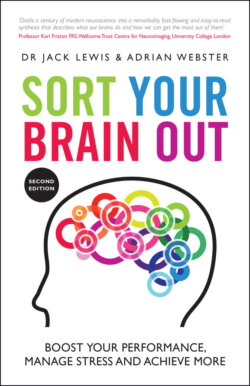Читать книгу Sort Your Brain Out - Джек Льюис, Адриан Вебстер - Страница 24
I want it now!
ОглавлениеOur brains might have changed over the years we've been alive, but human nature – as determined by our DNA – has not. The main reason why we, out of approximately 8.7 million other species currently sharing this planet, have been so successful is largely down to a deep‐rooted desire to feel a sense of progress. Thanks to lightning‐speed technology, we are now all advancing at an ever‐increasing rate with everybody expecting everything to be done in an instant – we want it now! And if we don't get what we want fast enough, human nature is such that we'll always be on the lookout for a shortcut. As soon as one becomes available, we'll take it!
With shortcuts at the very heart of human nature we are all, unsurprisingly, more than happy to take the quickest option that modern technology can provide. And with the prospect of life improvement being at the forefront of our minds, at the earliest opportunity most of us will interface with whatever the latest technology happens to be, in the belief that it's going to make life easier or more interesting. This is an assumption that many people end up regretting.
We may always be looking for the fastest, easiest route forward, using a whole array of “external brain” devices at our disposal, ranging from laptops to smartphones. We may have found numerous new ways of shifting a lot of the workload to them. But that doesn't necessarily mean that our brains are going to have less to do. Nor does it mean that they are going to become lazier and inevitably, having become semi‐dormant, find themselves out of a job.
On the contrary, a lot of the groundwork might be done for us, but by shifting it we simply free up cognitive resources for a new pile of (often unnecessary) extra work, along with a whole new set of pressures and obstacles created by it. All of which will need to be overcome and dealt with at an ever‐increasing rate.
When calculators first came onto the scene there were serious concerns that they would make minds stagnant by taking away the need for mental arithmetic. More recently, when internet search engines first appeared, there was much talk about them making brains intellectually lazy. In both instances, very little evidence accumulated to back up these concerns. Instead it seems that both innovations mostly unlocked new possibilities and, brains being brains, they have moved onto bigger, more exciting challenges.
Despite how much new technology arrives on the scene, if we fully utilize it in a way that finds balance with the non‐technologically enhanced aspects of life, our brains should be moving in the opposite direction to idleness. Having once been stretched to the limit by performing a particular function, they should find themselves having to grapple with completely different tests in new areas.
For example, where a brain was once challenged by the prospect of map reading, advancements in technology will mean that, despite no longer having to be quite so proficient in that skill, it will have to rise to the challenges of operating and following the instructions of satnav, but while still using your loaf. Those of us who have experienced setting off from A to go to B only to end up in C will know that this is no mean feat. Despite thousands of years' worth of inherited instinct and our gut feelings screaming at us that we are heading in completely the wrong direction, we still keep faith with the technology. It's important to be master, not slave, to our technologies; you still need to be the boss.
“The greatest task before civilisation at present is to make machines what they ought to be, the slaves instead of the masters of men.”
Havelock Ellis
